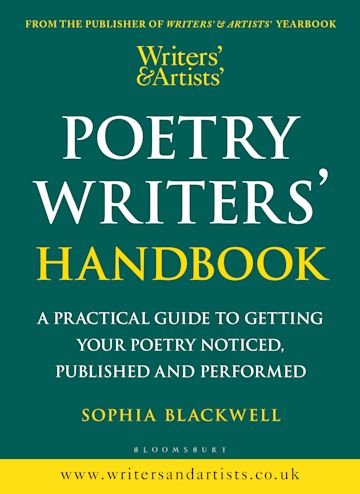In this abridged extract from the Poetry Writers' Handbook, author Sophia Blackwell offers advice on how to submit poetry.

Once you have started sending poems out to magazines, keep track of what you have submitted in a spreadsheet, Word document or notebook, detailing the name of the poem, where it was sent and on what date. You may be waiting a few months or more for confirmation of an acceptance or rejection. Most magazines ask that you do not send simultaneous submissions, but some will consider them so long as you update the magazine if the poem is published elsewhere. Just send a few poems, and don’t bombard one particular magazine with submissions while you’re still waiting to hear back about your first one.
Every publisher I spoke to in the preparation for this chapter was not seeking perfection. No publisher or magazine editor would advocate a complete dive into free expression where the poet just writes whatever they want, unmediated by any concern for rhythm or sense, but there needs to be enough of that poet’s authentic self to make the poem snag on the editor’s imagination, whereas a poem that has been polished to within an inch of its life might make less of an impression.
So much of it is about voice, and not so much about perfection. Often, we as poets worry about getting things perfect. I’ve read a lot of ‘perfect poems’ over the years, but I would often prefer to take the poem that is not quite perfect but has anincredible voice or way of seeing, and just has a real ability to be true to itself. I can tell when something is very well honed and polished, but sometimes the poet has almost edited themselves out of it. You read that edited poem and you think that, about five steps ago, there was still a sense of the writer within this work. I know a good submission when I remember it the next day, when I’m still thinking about it and the images have stuck in my brain like Post-it Notes. - Jane Commane
Certain words kept coming up when the editors spoke about the qualities they were looking for in a poem: tension, energy, voice, music. The publisher may not write in the same style as the submissions they are receiving, but they should still be able to see why the poem has potential. As I mentioned earlier, some of the poets I spoke to also work as editors, but they are not looking for carbon copies of their own writing styles:
For me, poetry is a lot about the rhythm, the music of the language, and I think the challenge, as an editor, is can I hear their music, their voice? They’re going to be writing differently to the way I instinctively create patterns of rhythm and sound in my own poetry. When I’m working on someone else’s poems I should always be finding lines which I wouldn’t have written in that way myself, because they’re not in my voice. But what I am looking for is a sense that the lines are operating under tension, that it feels like there’s movement and rhythm, something that carries me through and is making the language memorable and alive. - Alan Buckley
 Many magazines use the online platform Submittable, which it is worth familiarising yourself with – the rise of online platforms, as well as a general broadening in tastes and enthusiasm for poetry from other cultures and parts of the world, may eventually lead to a wider range of voices being included in UK poetry magazines, and it’s a good thing for UK poets too. Becoming familiar with Submittable means you won’t have to fiddle with postage fees and stamped addressed envelopes, and it also means that UK-based poets can submit to more international competitions and publications, including those in the US, in a frictionless way.
Many magazines use the online platform Submittable, which it is worth familiarising yourself with – the rise of online platforms, as well as a general broadening in tastes and enthusiasm for poetry from other cultures and parts of the world, may eventually lead to a wider range of voices being included in UK poetry magazines, and it’s a good thing for UK poets too. Becoming familiar with Submittable means you won’t have to fiddle with postage fees and stamped addressed envelopes, and it also means that UK-based poets can submit to more international competitions and publications, including those in the US, in a frictionless way.
Look out for advertisements of themed issues of poetry magazines, if the theme resonates with your work, and the same for poetry anthologies, which look good on your CV and sometimes mean a small fee. This can be an effective way to meet a publisher who you might work with on longer projects. It is likely that you will start your relationship with the person who will end up editing your full collection either through having worked with them on events or on a project such as a pamphlet or anthology. Include a short biography of about 100 words and a covering letter, email or online note, but bear in mind that this will have little effect on whether the submission is accepted, so be matter-of-fact and concise – don’t be tempted to exaggerate your achievements. While it is based on the example of a short story writer rather than a poet, Stephen King’s sample cover letter in On Writing is one of my favourites...
This article is an abridged extract from the Poetry Writers' Handbook, available to order at Bloomsbury.com.
Sophia Blackwell is a performance poet with three published collections of poetry and the author of a novel. Her poetry has been anthologised by Bloodaxe, Nine Arches and the Emma Press among others, and between Autumn 2019 and and 2021, she hosted the LGBT+ radio show Out in South London on Resonance FM, showcasing gay, lesbian, bisexual and trans authors, musicians, comedians and other creatives like her.
Recent notable gigs include four times at Glastonbury on the Poetry & Words Stage, Women of the World (WOW) Festival at the South Bank Centre and headlining a national tour with Hammer and Tongue. She is a Literary Death Match champion, Spread the Word LGBT Hero and Diversity Role Model. She was the Former Chair of Poetry London and is a freelance editor and the current Chair of the Pride Network at Hachette UK.
Comments